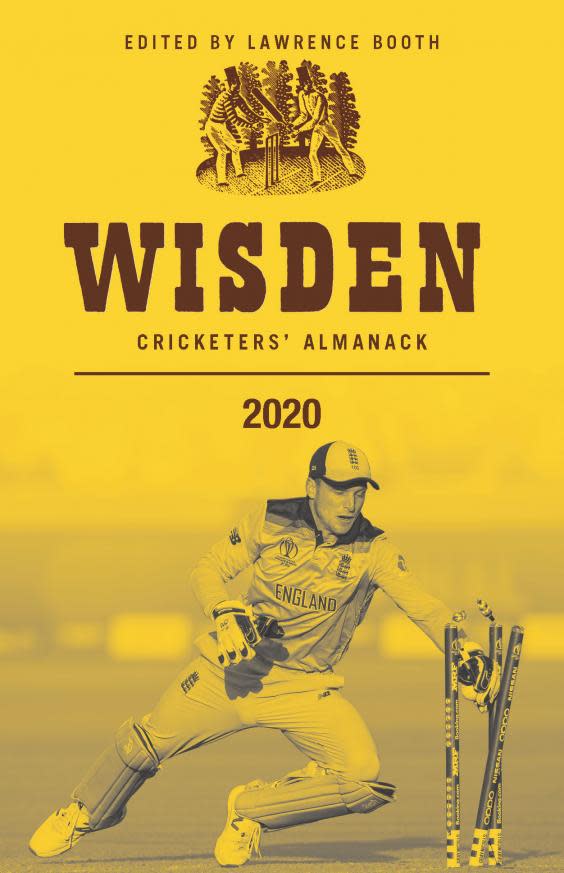Wisden Almanack arrives ahead of cricket’s most testing period since World War
Wednesday sees the launch of the 157th edition of the Wisden Cricketers’ Almanack. Since its maiden issue in 1864 it has catalogued English cricket, growing through the eras to become more wide-ranging in its global coverage and more exhaustive in its writings.
Yet on a day when one of the most sought-after editions of the yellow brick of a book comes out with its documenting of last summer, thoughts are already turning to what number 158 will look like. For while 2019’s cup was overflowing with a home World Cup win – England’s first in the 50-over edition – and a compelling Ashes series, 2020’s looks much less than half empty at this juncture.
No cricket will be played before 28 May and the whispers are there will be little until August. Possibly even none at all. The Covid-19 pandemic has had a profound effect on the world and its past-times. English cricket is no different.
In the short-term, Wisden has already felt the effects. Cancelling Wednesday’s annual showpiece dinner at Lord’s was the cloud, with the silver-lining coming in the chance to get as much of 2021’s edition in order while all forms of cricket remain indefinitely suspended. The nature of Wisden’s “seasons” are typical to the game’s packed and nonconforming schedule: the close is usually the end of any overseas series that started the previous year, which is South Africa-England for this edition.
The chance for the editorial staff to catch their breath is a welcome break from the normal conveyor belt of copy to tighten. But then comes the contingency planning ahead of what Lawrence Booth is already pegging as the toughest of his nine books as editor.
Booth has already begun consulting wartime Wisdens, along with the one produced to document a 1918 summer decimated by Spanish Flu. Beyond collecting thoughts, no worthwhile assessments can be made until cricket is actually played. As Booth says, the only certainty is a total wipeout will result in “a rather thinner book”.
“In the Second World War they were coming in around 400 pages,” Booth tells The Independent. “The First World War was closer to 300.
“It’s too early to say to what extent next year will be different from 2019. But this year’s was 1,563, as was last year’s, and that’s been roughly the figure for the last 10 or 15 years really. It will be nowhere near.”
The very nature of long-running almanacks means a summer of nothing does not equate to as little in prose. The cache Wisden has built up over 157 publications means the demand for a “coronavirus special” will be great, even if the innate desire from those charged with producing it is to avoid opportunism at a time when many are losing so much more than simply their sport.
A unique development would be if there was absolutely no cricket whatsoever this summer, even at grassroots level. That would be unprecedented.
“Even in the wartime summer there were RAF and Navy and the Empire XI and the London Counties,” says Booth. “The school section got big wraps. So there was still some cricket to report. When you browse through those Wisdens there were scorecards. We may not have that luxury for the English summer.”
Perhaps most daunting for tome rooted in traditionalism is the need to get creative to fill pages. However, under Booth’s stewardship that has not been an issue. He was the first editor to fully embrace women’s cricket and the game’s online culture.

Already his mind is mulling over ways of rearranging Wisden’s set-pieces without losing the book’s charm. The individual county sections, for example, may well be talking of how they survived a period that chief executive Tom Harrison describes as “the biggest challenge the ECB has faced in its history”. For the individual honours, that will require further innovation.
The five cricketers of the year have been awarded since 1889 to those who had an influence on the previous English summer. This year’s five of Jofra Archer, Marnus Labuschagne, Pat Cummins, Ellyse Perry and Simon Harmer, along with leading cricketer of the year Ben Stokes, all excelled on the field. But this summer's picks could be selected for how they stood up off it, depending on how much cricket is played, and whether it is deemed worthwhile.
“If there is some cricket played in the English summer we’d have to decide whether that was enough to justify the usual kind of ‘five’. If not, we’d have to be more inventive.
“There might be cricket played overseas in the southern hemisphere summer coming up in which case does that become part of the criteria for a one-off year? Or do we go broader with our criteria and say the cricketer of the year wasn’t just the best batter, bowler or wicketkeeper but someone who did something else in the virus. Heroes may emerge in a different kind of way.”
For consumers and cricketers, Wisden’s release is a starter pistol for a marathon summer that fills those raw gaps scathed by the harshness of winter. Though the pain of absence will endure, the book will at least fill part of that void. And, perhaps, its emergence right on schedule and the planning towards adhering to next year’s, is a small sign that there is life beyond this stasis.
For Booth, he found himself asking the same question now staring into 2020’s emptiness as he did this time last year ahead of 2019’s crammed summer: “How are we going to cope?”
The sense, even simply going by Wisden’s lifetime, is that he and we will find a way.

 Yahoo Sport
Yahoo Sport 





































